Scottish independence: UK parties 'will block money union'
- Published

Chancellor George Osborne, Labour Shadow Chancellor Ed Balls and Liberal Democrat Chief Secretary to the Treasury, Danny Alexander, are to take a unified position
The three main Westminster parties are to declare that whoever forms the next UK government will not enter a currency union with an independent Scotland.
The Conservatives, Labour and Liberal Democrats will make the comments on Thursday, the BBC has learned.
But Deputy Scottish First Minister Nicola Sturgeon predicted the move would "backfire spectacularly".
The Scottish government wants to keep the pound in a currency union if there is a referendum "Yes" vote.
The development came ahead of the Scottish independence vote, being held on 18 September.
Treasury review
Chancellor George Osborne, Labour Shadow Chancellor Ed Balls and Liberal Democrat Chief Secretary to the Treasury, Danny Alexander, will set out their views following a Treasury report looking at the future of the pound in the event of Scottish independence.
The Scottish government has said its currency union plan, which would see an independent Scotland retain the pound and the services of the Bank of England, was in everyone's best interests, and accused the Westminster parties of bullying tactics.
Sources have said the Treasury review, written by government officials and not by politicians, will argue that for an independent Scotland and the rest of the UK to continue to use the pound, the Scottish and UK governments would have to agree to:
Underwrite each other's banks
Allow taxpayers in one country to subsidise the other
Reach broad agreements on tax, spending and borrowing levels on both sides of the border
The Treasury review will not argue for or against a currency union, but in a speech in Edinburgh on Thursday, Mr Osborne will warn such arrangements would be unacceptable both for Scotland and the rest of the UK.
His speech is expected to be followed by similar comments from both Mr Balls and Mr Alexander.
Ms Sturgeon said the move was an "unprecedented and extraordinary bid by the Westminster establishment to lay down the law to Scotland, which will backfire spectacularly."
She added: "The reality is the Tory Chancellor and his Labour and Lib Dem helpers are all over the place, with their briefing fast unravelling.
"First we were told George Osborne was going to rule out a currency union, but now it is being reported that he will outline a Treasury paper with a series of tests and conditions which would be their starting point in negotiations to secure a Sterling area.
"That is a very long way from what was initially briefed, and simply underlines the fact that the Treasury themselves know - whatever the bluff and bluster of Westminster politicians - that a shared Sterling area is overwhelmingly in the rest of the UK's economic interests following a Yes vote."
Ms Sturgeon had earlier told BBC Radio's Good Morning Scotland programme that the UK government refusing a currency union would make no sense.
She said: "It would cost their own business hundreds of millions of pounds in transaction costs, it would blow a massive hole in their balance of payments, it would leave them having to pick up the entirety of UK debts".
Alistair Darling, leader of the Better Together campaign to keep the Union, said the Scottish government was making a "reckless threat".
The former UK chancellor said: "The impact of Alex Salmond's default would be to say to the world that we cannot be trusted to honour our debts.
"The result would be higher interest rates for Scots on mortgages and credit cards.
"One thing is certain - the only way to guarantee to keep the UK pound as our currency is to vote to keep Scotland a strong part of the UK."
But Labour's former Scottish First Minister Henry McLeish criticised the intervention by the three pro-union parties, and said Scots "shouldn't be fooled" by the suggestion that a currency union could not be worked out.
He told BBC Scotland: "This is entirely political and of course consistent with the unionist campaign. This is negative, it is about spreading fears and scare stories.
"What we require from the unionist parties is a bit of statesmanship and quite frankly their behaviour so far falls well short of that."
- Published12 February 2014